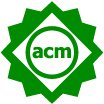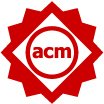AlloyMax: Bringing Maximum Satisfaction to Relational SpecificationsDistinguished Paper Award

Fri 27 Aug 2021 23:00 - 23:10 - Architectures & Design—Model-Driven Software Engineering Chair(s): Davide Di Ruscio
Alloy is a declarative modeling language based on a first-order relational logic. Its constraint-based analysis has enabled a wide range of applications in software engineering, including configuration synthesis, bug finding, test-case generation, and security analysis. Certain types of analysis tasks in these domains involve finding an \emph{optimal} solution. For example, in a network configuration problem, instead of finding any valid configuration, it may be desirable to find one that is most \emph{permissive} (i.e., it permits a maximum number of packets). Due to its dependence on SAT, however, Alloy cannot be used to specify and analyze these types of problems.
We propose $\textnormal{Alloy}^{\textnormal{Max}}$, an extension of Alloy with a capability to express and analyze problems with optimal solutions. $\textnormal{Alloy}^{\textnormal{Max}}$ introduces (1) a small addition of language constructs that can be used to specify a wide range of problems that involve optimality and (2) a new analysis engine that leverages a \emph{Maximum Satisfiability} (\emph{MaxSAT}) solver to generate optimal solutions. To enable this new type of analysis, we show how a specification in a first-order relational logic can be translated into an input format of MaxSAT solvers—namely, a Boolean formula in \emph{weighted conjunctive normal form} (\emph{WCNF}). We demonstrate the applicability and scalability of $\textnormal{Alloy}^{\textnormal{Max}}$ on a benchmark of problems. To our knowledge, $\textnormal{Alloy}^{\textnormal{Max}}$ is the first approach to enable analysis with optimality in a relational modeling language, and we believe that $\textnormal{Alloy}^{\textnormal{Max}}$ has the potential to bring a wide range of new applications to Alloy.